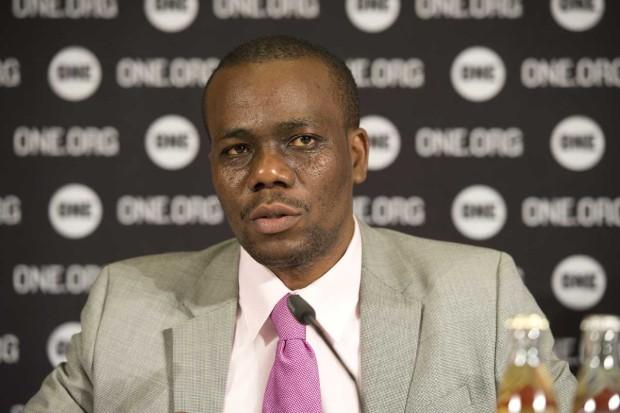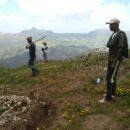US intervention in Kenya? No thanks.

The suggestion the US should intervene is based on half-truths and is an affront to sovereignty, argues Kenya’s Principal Secretary for Foreign Affairs.

Ambassador Macharia Kamau. Credit: IDLO.
That Mark Bellamy and Johnnie Carson are accomplished US diplomats is not in doubt. It may also be assumed that their relationship with Kenya as former ambassadors in Nairobi gives them a more than average understanding of Kenya’s politics, economy and even social aspects.
But their article, published here at African Arguments on 27 February, in which they call for US intervention in Kenya is a clear demonstration of how preconceived notions and stereotypes about Africa by Western technocrats override any practical experience and knowledge they may have acquired on the continent. Their knack for getting it wrong on African and Kenyan issues is not only dumbfounding but also a demonstration of why desk research on Africa, with the only source of information being a biased Western media, should be treated with disdain.
The authors seem to revel in misinforming their readers not only on the existing situation but also on the events that unfolded during Kenya’s 2017 election cycle. They talk of political chaos, possible intercommunal violence, and a palpable desire to change this trajectory. They even mourn that attempts by Western governments to appeal for calm are not being heeded.
The reader will note how the authors are keen to weave the now familiar narrative of a crumbling African State and the ever-benevolent Western states ready to intervene and sort “another fine mess in Africa”. Inevitably, attempts to weave this narrative in this article fall flat on their face due to the blatant use of lies, half-truths and innuendos.
Peace and tranquillity since the elections
It’s a fact that Kenya’s vibrant electioneering period ended with the swearing in of President Uhuru Kenyatta on 28 November, after he was duly elected in the 26 October 2017 repeat presidential elections. The claims that there is a deliberate attempt by the executive to subvert the rule of law cannot be further from the truth. Throughout the campaign period, the government demonstrated fidelity to the law with the president accepting the Supreme Court ruling nullifying the 8 August presidential election even as he, and other legal analysts, disagreed with it.
The main opposition coalition, clearly aware that their political strategy had failed, dithered and withered, eventually boycotting the repeat elections. Their attempts to perpetrate violence in the wake of their electoral loss have been rejected outright by Kenyans, with the government taking the necessary steps to fulfil its cardinal responsibility of protecting the lives and property of Kenyans.
In the long and arduous walk to entrench democratic principles, no individual or institution is exempt from the dictates of the constitution. Just like in any other democracy, the media, various arms of government, political parties, civil society groups, and all citizens are bound by the constitution and its violation has consequences in line with the rule of law.
The fact that Kenya went through the prolonged campaign period and emerged peaceful should be a reason to celebrate the resilience of her democracy. Kenya’s constitution, enacted in 2010, is barely eight years old. The 2017 elections presented an opportunity to test the institutions it created, including the Judiciary and the Independent Electoral and Boundaries Commission.
The question of whether the institutions withstood the test can be attested to by the peace and tranquillity in Kenya barely three months after the repeat elections. Kenyans are back to work and the economy, which had slightly slumped during the electioneering period, is now on an upward trend with the World Bank projecting 5% economic growth for 2018.
Even international investors have given the economy a vote of confidence by a sevenfold oversubscription of a Eurobond issued by the government in the London Stock Exchange on 21 February. The tourists are trooping back to enjoy the unrivalled Kenyan flora and fauna and bask in the white beaches of Malindi and the entire coastal region.
Double standards
The authors’ assertion that Kenya is unravelling due to what they refer to as a widening rift between the ruling Jubilee and the opposition NASA coalition betrays their double standards when it comes to democratic tenets in Africa as compared to in America.
It is not lost on Kenyans that the differences in ideologies between the Democrat and Republican parties and toxic political drama that culminated in the election of President Donald Trump in 2016 left some social and political fissures in America. But despite their divisive nature, the Trump vs. Clinton political campaigns can rightly be described as a demonstration of the vibrancy and maturity of America’s democracy.
In a clear display of bias and cognitive dissonance, Bellamy and Carson describe similar ideological differences and political rhetoric between the Jubilee Party and NASA Coalition during and after the elections as political turmoil. Competitive politics in a democracy, both in America and Africa, can never be described as turmoil. Political competition is a key tenet of democracy, and Kenya has demonstrated that, with strong institutions, credible and peaceful elections are possible.
An affront to Kenya’s sovereignty
On a positive note, the authors acknowledge the cordial relations between Kenya and the US, which they had an opportunity to strengthen during their respective tenures as ambassadors to Kenya. They use this as a basis for advocating for US intervention to prevent what they see as Kenya descending into violence and threats to rule of law.
But with memories of US interventions in countries such as Libya and Iraq, ostensibly to return them to democracy, still fresh in our minds, jitters about this proposal by senior US leaders are understandable. Any form of interference by the US in a country that has time and again demonstrated her commitment to entrench democratic principles, rule of law, and good governance can only portend danger.
It is no wonder that the current US ambassador in Nairobi, and indeed the entire US government, has risen above Kenya’s political challenges. Just as Ambassador Carson was proven wrong on his assertion before the 2013 elections that a victory for Uhuru Kenyatta would have negative consequences, the two countries have once again continued on the path of strengthening their bilateral relations and partnerships with a clear understanding of the need for mutual respect. The threats issued and grandstanding advocated for by the two US leaders is not only unfortunate but also an affront to Kenya’s sovereignty.
On her part, Kenya will maintain momentum in strengthening governance institutions, entrenching the rule of law, building a cohesive society, and buttressing peace within its borders and in the region. While we welcome positive and constructive criticism from our partners and friends, we remain averse to any suggestions of interference with our internal affairs from any quotas.
Our response to the authors’ absurd demand for US intervention in Kenya is a loud NO THANKS!







You as a Kikuyu who have oppressed other tribes can now say it is preconceived ideas!!! LET ME TELL YOU WE WILL FIGHT FOR OUR FREEDOM FROM KIKUYU AAND KALENJIN TRIBES WHO THINK THYE ARE SUPERIOR TO OTHERS!!! WE WILL FIGHT AGAINST YOUR OPPRESSION UNTIL WE GET IT!!
IN AFRICA JUSTICE BELONGS TO THE STRONG. The continent is much darker than it was known before 19th century
I was worried that the negative publicity of our Country by those two would go unnoticed,but today i am really excited that finally some one with a shovel has heeded the need to bury political prostitution by some western idlers who ran a way from therapy sessions to cause mayhem in a peaceful country as Kenya.
On point.
The position taken by the PS for foreign affair is not addressing the true position in Kenya and coming from a person benefiting from the current regime, it totally misrepresents the true situation pertaining in our country. Ordinary Kenyans will support his narrative the day the government stops intimidating journalists, interfering with judiciary and most of all allow the IEBC to conduct free, fair and transparent elections
Mr. Macharia, with all due respect, your scripted response to the firmer USA ambassador I’ll commissioners’ Feb 27th script on Kenya’s situation sounds more fiction than practical reality. You paint a false imagined thrive of peace and economic vibrancy. Is that really the current Kenyan situation?
You and the current holders of power are honestly behaving as an ostrich that has its head in the sand at an approaching danger.
Time will tell. What you have written, Mr. Macharia is a lie.
US , United nations , Eu etc, have become less interested in Africa affairs. Dictatorship is back almost everywhere.
UN is even worthless
Dr Macharia is right. Kenyans are smart and they voted smartly and the world saw It. What else did some people want? Whatever they wanted did not happen because the President knelt and prayed. His prayers were answered. People should now shut up and wait for 2022.